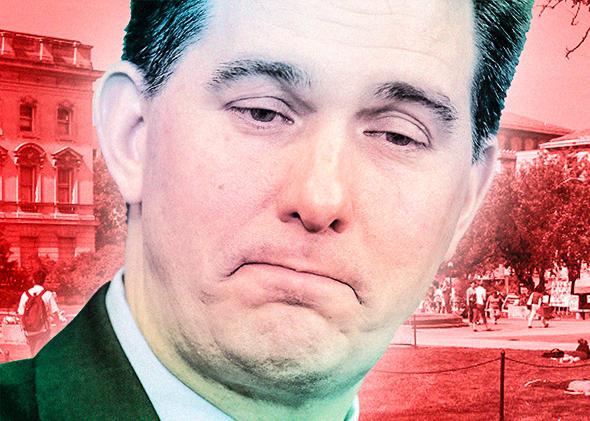Of the Republican presidential hopefuls, Scott Walker is not the most compelling, the most articulate, or the most attractive. He’s better than milquetoast but less interesting than vanilla. And with few exceptions, he doesn’t heat up a crowd as much as he brings it to lukewarm.
Despite all of this, however, the Wisconsin governor is the present front-runner for the GOP presidential nomination. A top-tier candidate and serious contender, and not the off-brand Tim Pawlenty he seemed to be before the Iowa Freedom Summit. What Walker has—and what makes him so appealing to Republican primary voters—is the fighting spirit of an ideologue. Not only is he committed to a doctrinaire conservative vision, he also knows who his enemies are and he’s willing to shell them into submission.
Walker’s first siege was in 2011, just after winning the governorship. Despite an election night promise of “moving the state forward together,” the newly minted executive entered office and promptly launched an attack on public-sector unions, powerful opponents who formed the backbone of the state’s Democratic Party. Walker’s proposal ended collective bargaining for pay raises and forbid unions from deducting fees from employee paychecks. It forced state workers to hold annual votes for union representation and required them to pay larger contributions to pensions and health care plans.
Unions fought back and mounted a rearguard action, collecting the signatures for a recall election. But the counterattack failed. Walker won his second election in two years, underscoring his anti-union reforms and raising his stature in the national Republican Party. By 2013, Wisconsin public employee unionization had dropped about 13 percent, the sharpest decline in the nation. Today these unions have fewer members, fewer funds, and fewer allies.
This year, ahead of a competitive presidential primary, Walker is out to distinguish himself again, this time with an ambitious push against another pillar of liberal Wisconsin. According to the Washington Post, the Republican governor will slash $300 million from the University of Wisconsin system over the next two years, a 13 percent reduction in state funding.
Team Walker says it’s just bookkeeping, a simple cut that comes with an even exchange: a two-year tuition freeze and new flexibility for administrators who want to set pay scales and campus construction priorities. “These reforms will give the U.W. System the power to transform higher education in this state for the future by empowering leaders, protecting taxpayers, and promoting long-term stability,” said a spokeswoman for the administration in an email to the New York Times. Likewise, in a post on Facebook, Gov. Walker treated the move as inconsequential to the university system. “Our budget changes are only 2.5% of the total UW System operating budget. 2.5%. In return, they get long-term flexibility and savings.”
That number is misleading. Sixty percent of U.W’s $6.1 billion budget is earmarked for research, athletics, and other purposes. Officials can’t move it or use it in place of state aid. When you count Walker’s cuts as a fraction of U.W’s discretionary budget, they jump from 2.5 percent of the whole to a full 6 percent, a small but substantial reduction.
And a cut of this size isn’t just bookkeeping. In a speech in London last week, Walker compared this push to his move against public-sector unions. “It’s very much like what we did four years ago,” he said. And he’s right. As policy and politics, this is a huge move. On the former, even a small cut means fewer faculty, larger classes, and fewer resources for the smaller satellites in the university system. And on the latter, Walker can stand as the fearless conservative warrior against a phalanx of liberal students, left-wing professors, and permissive bureaucrats. Every anti-Walker protest in Madison is another minute of b-roll for the governor’s primary ads, and every attack on his college record—or lack thereof—is just more anti-elitist fodder for debates and stump speeches.
Scott Walker knows his enemies. And he knows that strong targets offer fierce reactions but great rewards. By beating unions in a thickly unionized state, surviving a recall, and winning re-election, Walker captivated conservatives and pulled himself to the national stage. This is just the next step. How do you distinguish yourself from a crowd of culture war competitors like Mike Huckabee and Rick Santorum? You borrow a page from Spiro Agnew and provoke a culture war. You launch another raid on Wisconsin liberals, in hopes that they’ll take the bait and give you fuel for whatever you need to say.
Based on their reaction so far—“Walker doesn’t value the university,” said one government worker to the Times, “He has disdain for anything intellectual. He doesn’t care if the populace is educated”—his foils are doing just that. I’ll say it again: Scott Walker knows his enemies. And so far, they haven’t figured it out.
